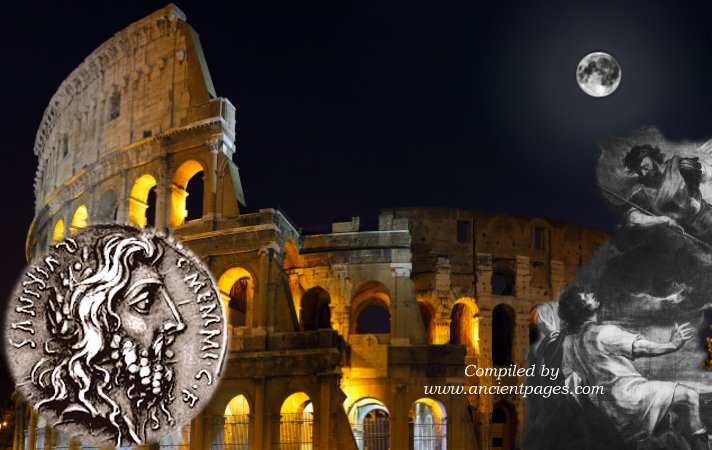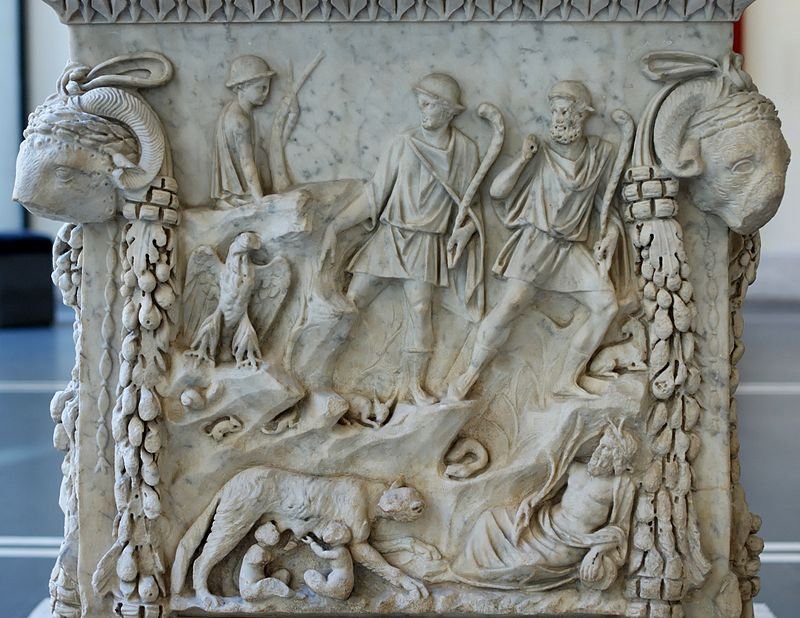Jan Bartek - AncientPages.com - The story of King Romulus is entertaining because it is an unusual mix of ancient history and mythology. The ancient supernatural touch added to this story makes the tale irresistible to anyone interested in ancient mysteries.
How and why did King Romulus disappear? Was he assassinated because he was considered a danger to Rome's security? What role did the dark cloud play when he vanished, and lastly, did Proculus lie about his strange vision?
Legend Of King Romulus
Legend has it Rome was founded on April 21, 753 B.C by Romulus. In Roman mythology, Romulus and his twin brother Remus were the children of Rhea Silvia and Mars (or in some variations, the demi-god hero Hercules). Rhea Silvia, was a vestal virgin and the daughter of the former king, Numitor, who had been displaced by his brother Amulius. Life for the young children was problematic from the beginning because they almost died as babies. Seeing Remus and Romulus as a possible threat to his rule, King Amulius ordered for them to be killed and they were abandoned on the bank of the river Tiber to die.
Fortunately, "the trough, in which they were placed floated down the river and came to rest at the site of the future Rome, near a sacred fig tree. There a she-wolf and a woodpecker—both sacred to Mars—suckled and fed them the boys until they were found by the herdsman Faustulus who along with his wife Acca Larentia took care of them.
The twins became leaders of a group of youths, eventually restoring their grandfather to the throne. They then founded a town on the site where they had been saved.
Altar to Mars (divine father of Romulus and Remus) and Venus (their divine ancestress) depicting elements of their legend. Tiberinus, the Father of the Tiber and the infant twins being suckled by a she-wolf in the Lupercal are below. A vulture from the contest of augury and Palatine hill are to the left. (From Ostia, now at the Palazzo Massimo alle Terme). Credit: Public Domain
When Romulus and Remus became adults, they decided to found their own city and each set out to find the best location. One day, the two brothers quarreled over where the site should be, and Remus was killed by his brother.
Romulus consolidated his power, and the city was named for him." 1
Was King Romulus Popular In Ancient Rome?
Many ancient authors described Romulus as a warrior who misused his power. "As the first king of Rome (which was named after him, and is otherwise known as the Eternal City), Romulus populated his new city with wanderers and outlaws.
To provide wives, he kidnapped women from the neighboring Sabine tribe (an incident known as 'The Rape of the Sabine Women'). He is also said to have established a ruling council (Senate) of 100 advisers, and their descendants (called 'patricians') became Rome's leading families.
According to the historian Livy, Rome was ruled by kings chosen by the Senate, beginning with Romulus and ending with Tarquin the Proud, whose unpopularity led to the establishment of a republic." 2
Romulus made many decisions that angered his population. His choice to release hostages taken from Veii, a powerful Etruscan city he conquered, weakened Rome's diplomatic position. King Romulus was accused of an almost tyrannical rule in Rome, and at the same time, he generously gave the people of Alba Longa, the ancient city where he was born, the right to select a different ruling magistrate each year.
He was also famous for his strict judgments and occasionally cruel death sentences. It is not farfetched to assume many people wanted to get rid of King Romulus, and there may be much truth to the assassination theory presented by modern scholars.
The Strange Vanishing Of King Romulus
It is said that after a reign of thirty-seven years, King Romulus suddenly vanished more or less into thin air. He was visiting his troops on the Campus Martius, when a sudden shower, attended with thunder and lightning, interrupted the military inspection. Those who participated in the parade stated King Romulus "had been suddenly enveloped in a flame which seemed to come down in a bright flash of lightning from the clouds, and immediately afterward had been taken up in the flame to heaven." 2
Few people believed this story. Many citizens suspected the senators had assassinated Romulus. Rumors spread; sometimes, one could hear the most exaggerated stories. The public was firmly against the senators, and Rome became a restless city with troubled, agitated citizens who wanted to solve the mystery of King Romulus' disappearance.
How The Strange Vision Of Proculos United The People Of Ancient Rome
Suddenly, a man with all the answers emerged, and no matter what we think of his story today, people of ancient Rome accepted the explanation. Proculos, one of the most prominent and distinguished of the senators who had not been at the site where Romulus vanished, announced "that the spirit of Romulus had appeared to him in a visible form, and had assured him that the story which the other senators had told of the ascension of their chieftain to heaven in a flame of fire was really true," writes David Pickering in the book Collins Gem Ancient Rome.
"I was journeying," said Proculus, "in a solitary place, when Romulus appeared to me. At first I was exceedingly terrified.
The form of the vision was taller than that of a mortal man, and it was clothed in armor of the most resplendent brightness. As soon as I had in some measure recovered my composure I spoke to it.
'Why,' said I, 'have you left us so suddenly? and especially why did you leave us at such a time, and in such a way, as to bring suspicion and reproach on the Roman senators?' 'I left you,' said he, 'because it pleased the gods to call me back again to heaven, whence I originally came. It was no longer necessary for me to remain on earth, for Rome is now established, and her future greatness and glory are sure. Go back to Rome and communicate this to the people. Tell them that if they continue industrious, virtuous, and brave, the time will come when their city will be the mistress of the world; and that I, no longer its king, am henceforth to be its tutelar divinity.'"
Apparition of Romulus before Proculus by Rubens. Credit: Public Domain
The people of Rome were overjoyed to hear this communication. Their doubts and suspicions were now all removed; the senators at once recovered their good standing in the public regard, and all was once more peace and harmony.
Altars were immediately erected to Romulus, and the whole population of the city joined in making sacrifices and in paying other divine honors to his memory.
The declaration of Proculus that he had seen the spirit of Romulus, and his report of the conversation which the spirit had addressed to him, constituted proof of the highest kind, according to the ideas which prevailed in those ancient days. In modern times, however, there is no faith in such a story, and the truth in respect to the end of Romulus can now never be known.
After the death of Romulus the senators undertook to govern the State themselves, holding the supreme power one by one, in regular rotation. This plan was, however, not found to succeed, and after an interregnum of about a year, the people elected another king." 2
"Legends say Numa Pompilius was the second king of Rome, but he was not a warrior king but rather a statesman and politician.
During his reign, Numa introduced new laws, customs, cults, and holidays. In contrast to the times of King Romulus and the city of Rome involved in wars, the ruler Numa Pompilius wanted his Rome to experience more quiet times." 3
Updated on November 2, 2023
Written by Jan Bartek - AncientPages.com Staff Writer
Copyright © AncientPages.com All rights reserved. This material may not be published, broadcast, rewritten or redistributed in whole or part without the express written permission of AncientPages.com
Expand for references- On This Day In History: Myth Says Ancient Rome Was Founded By Romulus – On Apr 21, 753 BC, AncientPages.com
- David Pickering - Collins Gem Ancient Rome: The Entire Roman Empire in Your Pocket
- Sutherland - Numa Pompilius – Remarkable Legendary Second King Of Ancient Rome Who Succeeded Romulus – Did He Ever Exist? AncientPages.com
- Ovid – Metamorphoses
- Plutarch – Parallel Lives: Life of Romulus
- Livy – Ad Urbe Condita







